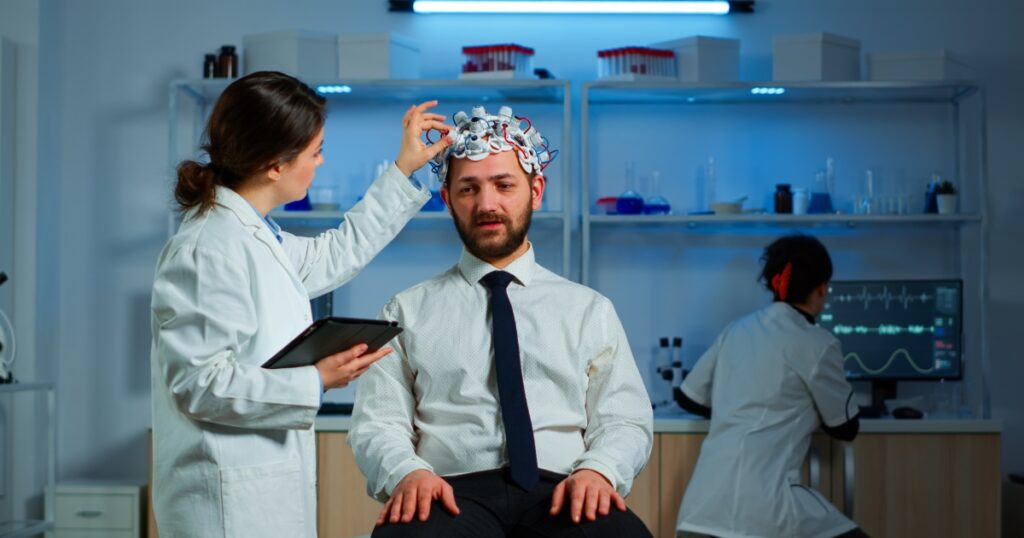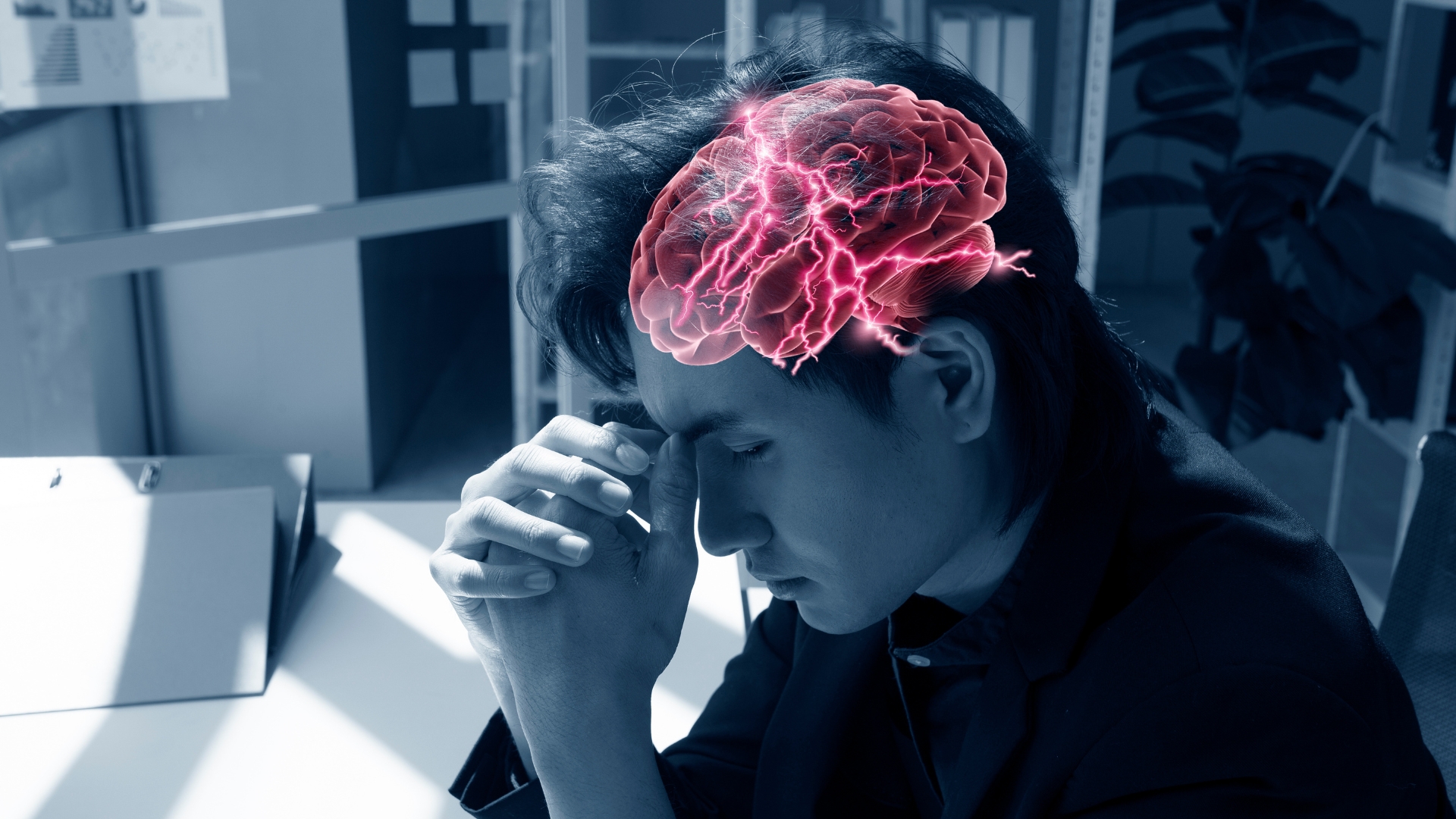You walk into a room and forget why you came. You stare at the computer screen, but unable to focus. Simple tasks feel overwhelming.
Brain fog feels like mental cloudiness where you can’t think clearly, remember things, or concentrate properly. It’s not a medical diagnosis but a symptom affecting millions daily. Your mind feels fuzzy, slow, and disconnected from your usual sharp thinking.
Moreover, it can make you feel frustrated and worried about your mental abilities. Thus, let’s explore what brain fog feels like and why it happens.
What Exactly Is Brain Fog?
Brain fog is a group of symptoms that affect cognitive function. Think of it like trying to see through a dirty windshield. Everything looks blurry and unclear.
Your brain processes information quickly and efficiently. But, this processing slows down significantly. Additionally, the connections between thoughts become weaker.
Research from Johns Hopkins shows it affects up to 600 million people worldwide. Furthermore, it’s become increasingly common since the COVID-19 pandemic began.
What Does it Feel Like to Have Brain Fog?
When you are suffering from brain fog, you might encounter these things:
Mental Cloudiness and Confusion
The most common description is feeling like your head is filled with cotton. Your thoughts feel muffled and distant. Simple decisions become surprisingly difficult.
For example, choosing what to eat for lunch might take 20 minutes instead of 2 minutes. Additionally, you might read the same paragraph three times without understanding it.
Many describe it as “thinking through mud” or “having a foggy windshield in your brain.”
Memory Problems and Forgetfulness
It makes both short-term and long-term memory unreliable. You might forget conversations from yesterday. You can’t remember where you put your keys five minutes ago.
Common memory issues include:
- Forgetting people’s names mid-conversation
- Losing track of what you were saying
- Missing appointments you wrote down
- Forgetting familiar words or phrases
- Unable to recall recent events clearly
Research from Harvard Medical School shows that brain fog can reduce working memory capacity by up to 40%.
Difficulty Concentrating and Focusing
Your attention span becomes much shorter than usual. Tasks that take 30 minutes take 2 hours. Moreover, you get distracted by every slight noise or movement.
Reading becomes particularly challenging. You might read the same sentence many times without absorbing the meaning. Additionally, following complex instructions feels nearly impossible.
Mental Fatigue and Exhaustion
Your brain feels tired even when you haven’t done much thinking. Mental tasks that were once easy now drain your energy completely.
For instance, a simple work meeting might leave you feeling mentally exhausted for hours. Additionally, making decisions becomes overwhelming and tiring.
Feeling Disconnected or “Spaced Out”
Many people describe feeling detached from their surroundings. You might feel like you’re watching life through a glass wall. Conversations happen around you rather than with you.
This disconnected feeling can be scary. You know something isn’t right, but you can’t quite put your finger on what’s wrong.
What Are the Different Types of Brain Fog?
Here are the common types:
Mild Brain Fog
Mild brain fog feels like having a slightly “off” day. You might notice:
- Taking longer to complete familiar tasks
- Occasionally forgetting common words
- Feeling less sharp than usual
- Needing to reread things once or twice
This level doesn’t significantly impact your daily life. However, it can be frustrating and concerning.
Moderate Brain Fog
Moderate brain fog noticeably affects your daily functioning. Symptoms include:
- Difficulty following conversations
- Forgetting important appointments
- Taking much longer to complete work tasks
- Feeling overwhelmed by simple decisions
At this level, brain fog starts interfering with work performance and relationships.
Severe Brain Fog
Severe brain fog can be debilitating. People experience:
- You are unable to concentrate for more than a few minutes
- Forgetting how to do familiar tasks
- Feeling completely disconnected from reality
- Extreme mental fatigue after minimal thinking
This level often requires medical evaluation and intervention.
What Causes Foggy Brain?
Here are some of the reasons that can cause brain fog:
Sleep Deprivation and Poor Sleep Quality
Lack of quality sleep is one of the most common causes. Your brain needs 7-9 hours of restorative sleep to function correctly.
During sleep, your brain clears out toxins and consolidates memories. Without adequate sleep, these processes don’t happen effectively. As a result, you wake up with cloudy thinking.
Research from the University of California shows that even one night of poor sleep can reduce cognitive function by 40%.
Chronic Stress and Anxiety
Ongoing stress floods your brain with cortisol and other stress hormones. These chemicals interfere with normal brain function over time.
When you’re constantly stressed, your brain stays in “fight or flight” mode. This leaves fewer resources available for clear thinking and memory formation. Additionally, chronic stress shrinks the prefrontal cortex, which controls executive function.
Hormonal Imbalances
Fluctuating hormones significantly affect brain function. This is particularly common during:
- Menopause and perimenopause
- Pregnancy and postpartum periods
- Thyroid disorders
- Diabetes and blood sugar imbalances
Estrogen, progesterone, and thyroid hormones play crucial roles in brain health. When these hormones are imbalanced, brain fog often follows.
Nutritional Deficiencies
Your brain needs specific nutrients to function optimally. What vitamin deficiency causes brain fog? Common deficiencies include:
- B vitamins are essential for neurotransmitter production. Deficiencies in B12, folate, and B6 directly impact cognitive function.
- Vitamin D supports brain health and mood regulation. Low levels are linked to depression and cognitive decline.
- Iron deficiency reduces oxygen delivery to your brain. This causes fatigue and mental cloudiness.
- Omega-3 fatty acids maintain brain cell membranes and support communication between neurons.
Food Sensitivities and Inflammation
Certain foods can trigger inflammatory responses that affect your brain. Common culprits include:
- Gluten in sensitive individuals
- Dairy products cause inflammation
- High sugar foods create blood sugar spikes
- Processed foods with artificial additives
When your body fights food-related inflammation, it diverts resources from optimal brain function.
Medical Conditions
Several health conditions commonly cause brain fog:
- Autoimmune diseases like lupus, multiple sclerosis, and rheumatoid arthritis often include brain fog symptoms.
- Chronic fatigue syndrome and fibromyalgia frequently involve severe cognitive symptoms.
- Depression and anxiety can significantly impact concentration and memory.
- Long COVID has made brain fog a widely recognised symptom affecting millions of people.
How Long Does Brain Fog Usually Last?

It depends entirely on its underlying cause.
Temporary Brain Fog
Short-term brain fog might last hours to days. Common causes include:
- Poor sleep (resolves with good rest)
- Acute stress (improves when stress reduces)
- Dehydration (clears with proper hydration)
- Blood sugar crashes (resolves with stable eating)
Chronic Brain Fog
Long-term brain fog can persist for months or years. This usually indicates underlying health issues that need addressing:
- Hormonal imbalances require treatment
- Chronic medical conditions needing management
- Nutritional deficiencies requiring supplementation
- Ongoing stress requires lifestyle changes
Research shows that addressing root causes can improve brain fog within 4-12 weeks.
When Should You Worry About Brain Fog?
You should be worried if you see these symptoms:
Red Flag Symptoms
Seek immediate medical attention if brain fog comes with:
- Sudden onset of severe confusion
- Difficulty speaking or understanding speech
- Loss of coordination or balance
- Severe headaches or vision changes
- Personality changes or mood swings
These symptoms could indicate severe medical conditions requiring urgent care.
When to See a Doctor
Consider a medical evaluation if you experience brain fog:
- Persists for more than a few weeks
- Significantly impacts your work or relationships
- Worsens over time instead of improving
- Occurs with other concerning symptoms
- Doesn’t improve with lifestyle changes
A healthcare provider can run tests to identify underlying causes and recommend appropriate treatments.
What Makes Brain Fog Better or Worse?
Things That Worsen Brain Fog
Certain factors consistently make brain fog worse:
- Lack of sleep or poor sleep quality
- High stress levels and anxiety
- Dehydration and poor nutrition
- Sedentary lifestyle with no exercise
- Excessive screen time and digital overload
- Alcohol consumption and certain medications
Things That Improve Brain Fog
These strategies often help alleviate mental cloudiness:
- Getting 7-9 hours of quality sleep nightly
- Regular exercise and physical movement
- Stress management techniques like meditation
- Eating nutrients, vitamins, and anti-inflammatory foods
- Staying properly hydrated throughout the day
- Taking breaks from screens and mental tasks
How Do You Track Your Brain Fog Patterns?
You can adopt the following things:
Keep a Brain Fog Journal
Track daily:
- Severity level (1-10 scale)
- Duration of symptoms
- Potential triggers (foods, stress, sleep)
- Activities that help or worsen symptoms
- Overall mood and energy levels
Use Simple Rating Systems
- Clarity of thinking (clear, slightly foggy, very foggy)
- Memory function (sharp, okay, poor)
- Concentration ability (focused, distracted, unable to concentrate)
- Mental energy (high, moderate, low, exhausted)
This information helps healthcare providers understand your condition better.
What Questions Should You Ask Your Doctor?
You should:
Preparing for Your Appointment
Come prepared with specific details:
- When did brain fog start?
- How severe is it on a typical day?
- What makes it better or worse?
- What other symptoms do you have?
- What medications and supplements do you take?
Important Questions to Ask
Consider asking your healthcare provider:
- What tests can identify the cause of my brain fog?
- Could my medications be contributing to this?
- What lifestyle changes might help?
- When should I expect to see improvements?
- Are there any red flag symptoms I should watch for?
Conclusion
Brain fog isn’t a disease; it’s a signal that something in your body or lifestyle needs attention. Whether caused by poor sleep, stress, hormonal changes, or nutritional gaps, it can affect your focus, memory, and daily life. The good news is, with the right habits, nutrition, and professional support, brain fog can often be reduced or even fully cleared.
Frequently Asked Questions
Is brain fog a sign of dementia or Alzheimer’s disease?
Brain fog is usually not related to dementia, especially in younger people. However, a healthcare provider should evaluate persistent cognitive changes in older adults to rule out severe conditions.
Can stress or anxiety really cause brain fog?
Yes, chronic stress significantly impacts cognitive function. Stress hormones like cortisol interfere with memory formation and clear thinking. Managing stress often improves brain fog symptoms substantially.
How is brain fog different from normal forgetfulness?
Regular forgetfulness is occasional and doesn’t significantly impact daily life. Brain fog involves persistent mental cloudiness that affects multiple cognitive functions and interferes with everyday activities.
Can certain foods cause brain fog?
Yes, food sensitivities and blood sugar imbalances can trigger brain fog. Everyday triggers include gluten, dairy, sugar, and processed foods. An elimination diet can help identify personal triggers.
Will brain fog go away on its own?
Brain fog caused by temporary factors like poor sleep or stress often resolves when the underlying issue is addressed. However, chronic brain fog usually requires identifying and treating root causes.
Can exercise help with brain fog?
Regular exercise improves blood flow to the brain and supports cognitive function. Light physical activity, like walking, can help clear mental cloudiness and enhance focus.
Which supplement is good for brain fog?
Omega-3 fatty acids, B vitamins, magnesium, vitamin D, and adaptogens like Rhodiola or Lion’s Mane are often recommended for reducing brain fog and improving focus.

